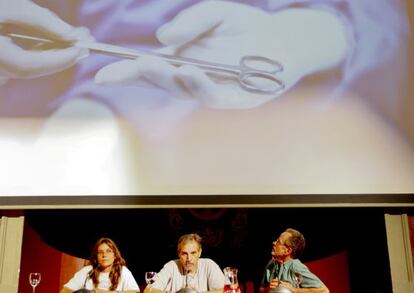Fighting cuts with a slice of cinema
Director Fernando Colomo condemns healthcare spending slash in short movie


The operating room is ready; the patient lying down and sedated. The operation is about to begin. "Scissors," requests the surgeon, and he receives them in his hand. "Scissors," he requests again. "Scissors," he says a third time - and a fourth, and a fifth, and sixth, up to 10 incisions. A beep sounds: the patient has died. "If we cut health, we cut life," reads the slogan that flashes up against a black background.
The whole thing lasts barely one minute, 15 seconds. It is a short, or more accurately a protest ad, made with no written script, no money and no operating room in which to shoot.
However, director Fernando Colomo says he had a great time filming it for the 15-M protest movement's Health Group.
"It was a very nice experience - a miracle that demonstrates that when you have the urge to do things you can do them," he says after the screening of the spot in the Ateneo de Madrid cultural institution.
The work is called Scissors and has been available to watch on YouTube since Tuesday. Colomo, whose movies include South from Granada (2003), previously directed a short in 2008 to condemn the privatization of public health in regions governed by the conservative Popular Party, which is now in power at the national level.
We are witnessing a counterreformation that will result in two health systems"
"It was prophetic," says Javier González Medel, the doctor, friend of Colomo and 15-M member who got the director involved in a similar experience again. "Back then we condemned the fact that we were going to end up having to cure ourselves, and now that it is where we are getting to."
"I didn't want it to be a comedy, but neither did I want it to be gloomy," Colomo explains. "It has come out fairly everyday." The cost of the project was "zero; well maybe the beers that Javier bought us at the end," the filmmaker jokes.
In total, beers included, it took five hours to shoot the film. To recreate the operating theater, they used a friend's dental surgery in the Villaverde de Alto neighborhood of Madrid and they borrowed the equipment. As they didn't have enough scissors, the actors playing the hospital staff passed them round in a circle so they would keep appearing in shot. An anesthetist from the 12 de Octubre Hospital offered them advice to ensure the operation looked as real as possible - where to position the staff, the equipment, and so on - advising them, for example, to use surgical tape to cover up the eyes of the patient.
They shot with no other lights than those in the dental practice and using a camera belonging to cinematographer Néstor Calvo, who has worked with Colomo on such films as Los años bárbaros . "Everybody worked in an unselfish way. I was the driver, production assistant and sound man," says Colomo.
The presentation of the film morphed into a discussion on the threats hovering over public health. A banner condemned the end of 26 job categories in Madrid hospitals, the services of which are set to be privatized.
"The crisis is an excuse to dismantle the public system. We are witnessing a counterreformation in health that is going to result in two health systems - one that has resources and another that doesn't, but is like a charity," says the health professional González Medel.
"The Madrid regional budget diverts more money into private health and less to public health every day," adds Dori García, a nurse.
"What can we do? We have paid for the health system with our taxes. It seems that people won't act until it directly affects them," cries out a woman from the audience.
Tu suscripción se está usando en otro dispositivo
¿Quieres añadir otro usuario a tu suscripción?
Si continúas leyendo en este dispositivo, no se podrá leer en el otro.
FlechaTu suscripción se está usando en otro dispositivo y solo puedes acceder a EL PAÍS desde un dispositivo a la vez.
Si quieres compartir tu cuenta, cambia tu suscripción a la modalidad Premium, así podrás añadir otro usuario. Cada uno accederá con su propia cuenta de email, lo que os permitirá personalizar vuestra experiencia en EL PAÍS.
¿Tienes una suscripción de empresa? Accede aquí para contratar más cuentas.
En el caso de no saber quién está usando tu cuenta, te recomendamos cambiar tu contraseña aquí.
Si decides continuar compartiendo tu cuenta, este mensaje se mostrará en tu dispositivo y en el de la otra persona que está usando tu cuenta de forma indefinida, afectando a tu experiencia de lectura. Puedes consultar aquí los términos y condiciones de la suscripción digital.








































